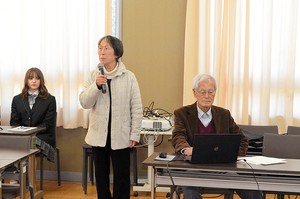June 24, 2022 at 13:45 JST
 Heads of nine major political parties participate in a debate at the Japan National Press Club in Tokyo on June 21, a day before official campaigning started for the July 10 Upper House election. (The Asahi Shimbun)
Heads of nine major political parties participate in a debate at the Japan National Press Club in Tokyo on June 21, a day before official campaigning started for the July 10 Upper House election. (The Asahi Shimbun)
It is little surprise that Russia’s aggression against Ukraine has made Japanese uneasy about their own nation’s security.
But we should ask ourselves whether any attempt to play on their anxiety to push for a rapid military buildup will secure peace and stability.
The role of politicians is to map out a comprehensive security and foreign policy strategy that will work.
With the official campaign period for the July 10 Upper House election under way, security policy is drawing more public attention than in the past.
Many political parties support the basic principles that call on the government to build on the foundation of the Japan-U.S. alliance and expand cooperation with like-minded Asian and European countries, while establishing necessary defense capabilities.
But there are wide disagreements among the parties in how to enhance deterrence.
The ruling Liberal Democratic Party has pledged to significantly ramp up the defense budget within five years, citing 2 percent or more of gross domestic product, a target adopted by NATO, as a benchmark.
The LDP’s campaign platform also includes a promise to ensure that Japan will “possess” the capability of striking enemy bases, now reworded as a “counterstrike capability.”
In its policy booklet, the LDP states the envisioned capability will cover not just missile bases in enemy territory but also command function facilities.
Japan’s defense budget has been around 1 percent of GDP. Raising the ratio to 2 percent would likely make Japan the third largest military power following the United States and China.
That would radically change Japan’s international image as a peace-loving nation, which has been cultivated through decades of adhering to a restrictive security policy based on its pacifist Constitution.
Japan’s defense spending drive, along with the acquisition of the offensive capability to strike the enemy’s security nerve center, could intensify the arms race and undermine stability in the region.
While the LDP’s campaign platform calls for such a significant shift in security policy, Prime Minister Fumio Kishida has continued equivocating on related issues.
He has denied having a specific numerical target for defense spending expansion and also said his government is only “considering” the proposal to give the Self-Defense Forces the capability to attack enemy bases.
Kishida should not be allowed to accelerate the initiative once the Upper House election is over without offering detailed explanations about financing and other related plans before the poll.
Among the opposition parties, Nippon Ishin (Japan Innovation Party) has made a clear commitment to raising the defense budget to 2 percent of GDP. The Democratic Party for the People has called for “the striking (counterstrike) capability for self-defense.”
The two parties may provide support for the LDP, whose security policy agenda is focused on military power, as the government starts to revise the national security strategy and formulate a draft budget for the next fiscal year toward the year-end.
Komeito, a party committed to pacifist principles, should clarify its position on the issue as the LDP’s junior coalition partner during the campaign period.
The main opposition Constitutional Democratic Party of Japan has also stressed the importance of a “reliable national security” policy.
The CDP has vowed to boost the quality of defense capabilities while avoiding specifying a target amount for defense spending. But the party has also said it will pursue “peace through dialogue.”
The Japanese Communist Party has placed “dialogue” at the forefront of its national security policy platform, promising “diplomatic efforts” to discourage any attempt to wage war against Japan.
The JCP needs to offer a convincing alternative to a policy focused on military expansion.
The upcoming election is shaping up as a potential major turning point for Japan’s postwar security policy.
All the parties should present clear visions and specific plans to realize them and, through exhaustive debate, provide key information for voters to make their decisions at the polls.
--The Asahi Shimbun, June 24




















A peek through the music industry’s curtain at the producers who harnessed social media to help their idols go global.
A series based on diplomatic documents declassified by Japan’s Foreign Ministry
Here is a collection of first-hand accounts by “hibakusha” atomic bomb survivors.
Cooking experts, chefs and others involved in the field of food introduce their special recipes intertwined with their paths in life.
A series about Japanese-Americans and their memories of World War II